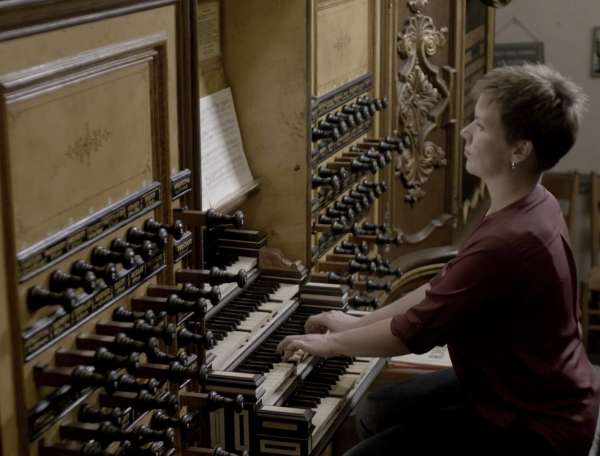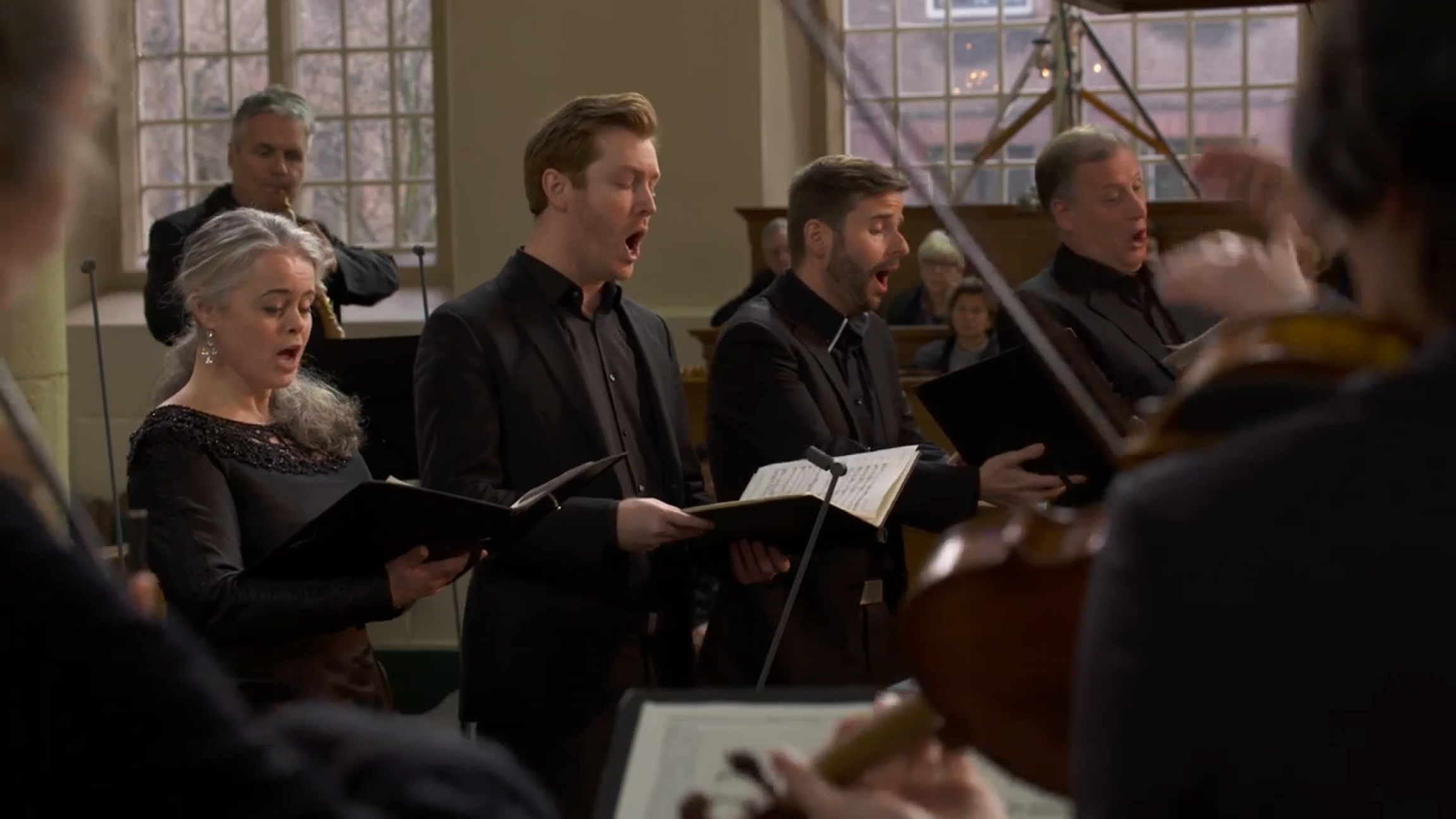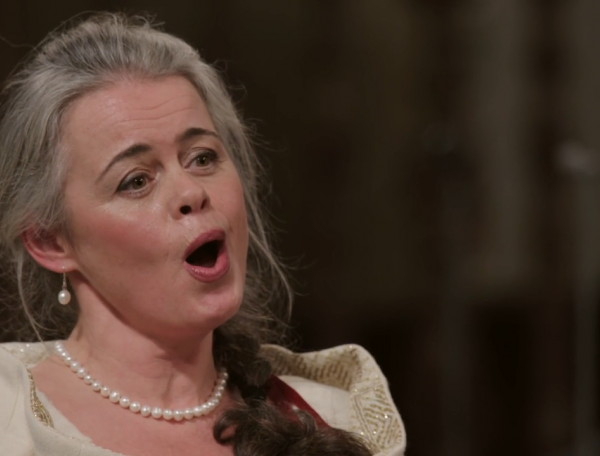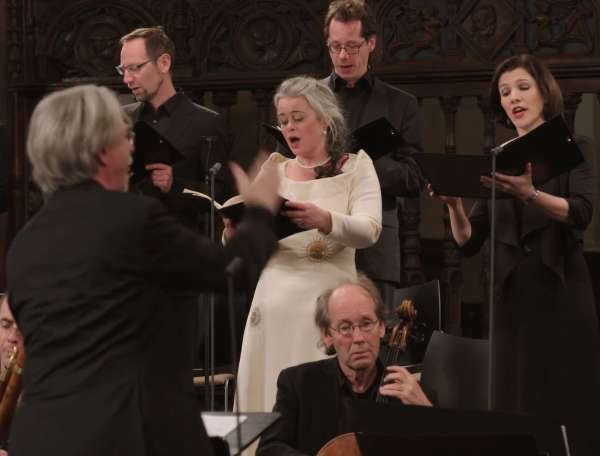

Sanctus in D major
BWV 238 performed by the Netherlands Bach Society
conducted by Jos van Veldhoven
Walloon Church, Amsterdam
Behind the music
Multilingual
Contrary to popular belief, Luther argued for multilingualism in the church
“I am not at all in sympathy with those who cling to one language and despise all others”, wrote Martin Luther in the introduction to his Deutsche Messe, and “for in no way do I want to banish the Latin tongue entirely from the Service”. Although German usually springs to mind when we think of Bach and Luther, in reality things were more multilingual. Particularly in university cities like Leipzig, Latin remained important in the church. The hymn book by Gottfried Vopelius that was used in Leipzig is full of Latin texts. It contains three versions of the Sanctus: two Gregorian melodies and a six-part setting for major feast days.
Bach himself also had a series of festive Sanctus settings for such occasions; partly his own compositions and partly those of others. The unusual thing about the Sanctus, BWV 238, is that there are only two independent instrumental parts: the bass part and the first violins. The other instruments double the four-part choir. So the whole work is six-part, just like Vopelius’ Sanctus. This is probably due to the biblical source of the Sanctus, as the book of Isaiah tells of seraphim with ‘six wings’ who sing the Sanctus to one another.
Besides Latin and German, Luther would have liked even more variation: “if the Greek and Hebrew tongues were as familiar to us as Latin, […] we should hold mass on successive Sundays in all four languages, German, Latin, Greek and Hebrew.”. The Sanctus itself takes the initiative, beginning with the words “Sanctus dominus Deus sabaoth...”. The last word (meaning “army” or large group”) comes via the Greek Σαβαώθ from the Hebrew צבאות. Luther himself left it at Zebaoth. The more multilingual, the better, he may have thought.
- BWV
- 238
- Title
- Sanctus (in D major)
- Genre
- Latin church music
- Year
- 1723
- City
- Leipzig
- Lyricist
- Mass text
- Occasion
- Christmas 1723
- First performance
- 25 December 1723
- Special notes
- probably performed during Bach's first Christmas in Leipzig during the morning service, along with cantata BWV 63
Extra videos
Vocal texts
Original
Sanctus Dominus
Deus Sabaoth.
Pleni sunt coeli et terra
gloria eius.
Translation
Holy Lord,
God of hosts.
Heaven and earth
are full of your glory.
Credits
-
- Release date
- 30 November 2018
-
- Recording date
- 11 February 2018
-
- Location
- Walloon Church, Amsterdam
-
- Conductor
- Jos van Veldhoven
-
- Soprano
- Maria Keohane
-
- Alto
- Tim Mead
-
- Tenor
- Daniel Johannsen
-
- Bass
- Matthew Brook
-
- Ripieno soprano
- Hilde Van Ruymbeke, Marjon Strijk
-
- Ripieno alto
- Barnabás Hegyi, Marleene Goldstein
-
- Ripieno tenor
- Kevin Skelton, Guy Cutting
-
- Ripieno bas
- Drew Santini, Matthew Baker
-
- Violin 1
- Shunske Sato, Anneke van Haaften, Pieter Affourtit
-
- Violin 2
- Sayuri Yamagata, Lidewij van der Voort, Paulien Kostense
-
- Viola
- Staas Swierstra, Jan Willem Vis
-
- Cello
- Richte van der Meer, Lucia Swarts
-
- Double bass
- Robert Franenberg
-
- Oboe
- Martin Stadler
-
- Bassoon
- Benny Aghassi
-
- Organ
- Leo van Doeselaar
-
- Harpsichord
- Siebe Henstra
-
- Director and editor
- Bas Wielenga
-
- Music recording
- Guido Tichelman, Bastiaan Kuijt, Pim van der Lee
-
- Music recording, edit and mix
- Guido Tichelman
-
- Camera
- Merijn Vrieling, Ivo Palmen, Martin Struijf, Bjorn Tiebout
-
- Director of photography
- Merijn Vrieling
-
- Lights
- Zen Bloot, Henry Rodgers, Patrick Galvin
-
- Assistant director
- Ferenc Soeteman
-
- Video engineer
- Vincent Nugteren
-
- Set technique
- Dennis van Hoek
-
- Data handling
- Jesper Blok
-
- Project manager nep
- Peter Ribbens
-
- Interview
- Onno van Ameijde, Marloes Biermans
-
- Producer concert
- Imke Deters
-
- Producer film
- Jessie Verbrugh
Discover
Help us to complete All of Bach
There are still many recordings to be made before the whole of Bach’s oeuvre is online. And we can’t complete the task without the financial support of our patrons. Please help us to complete the musical heritage of Bach, by supporting us with a donation!

